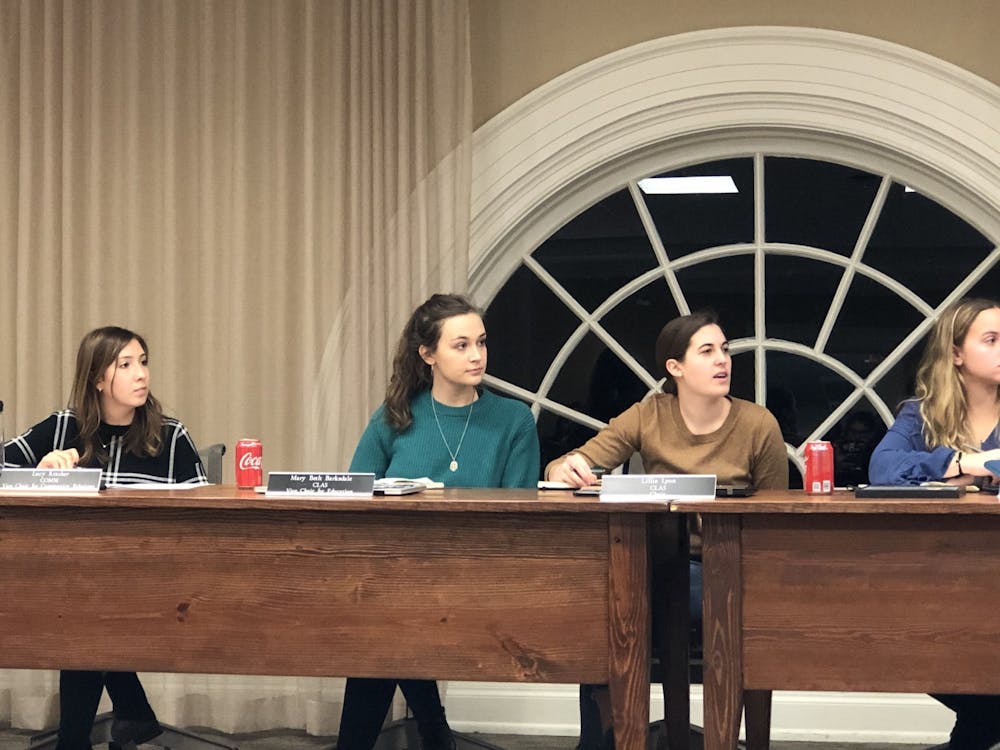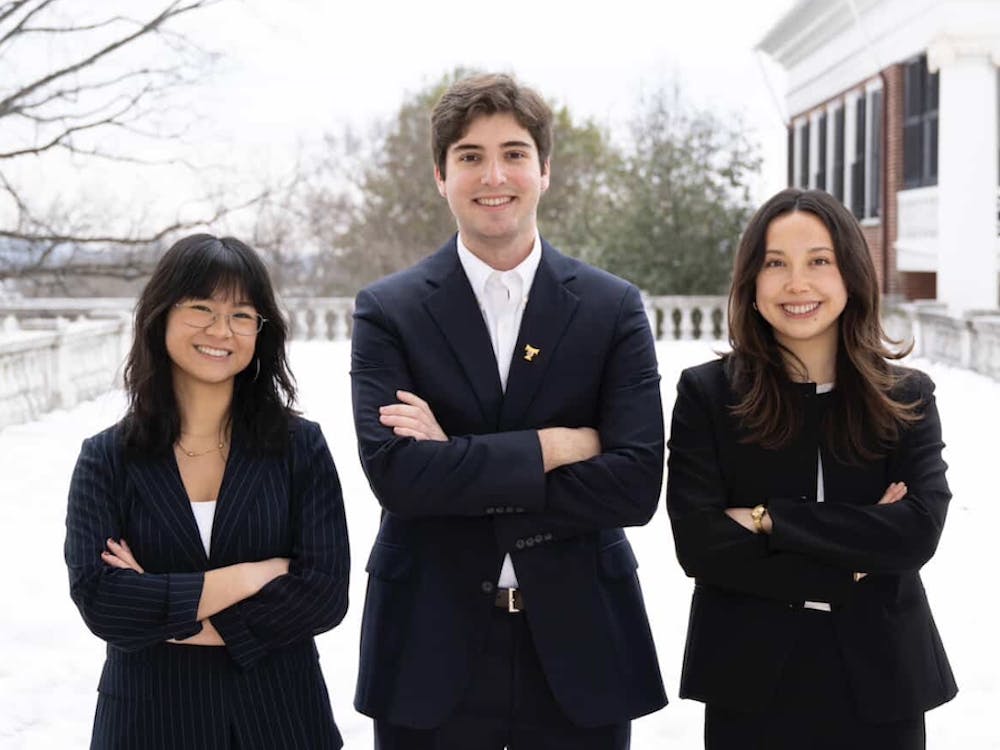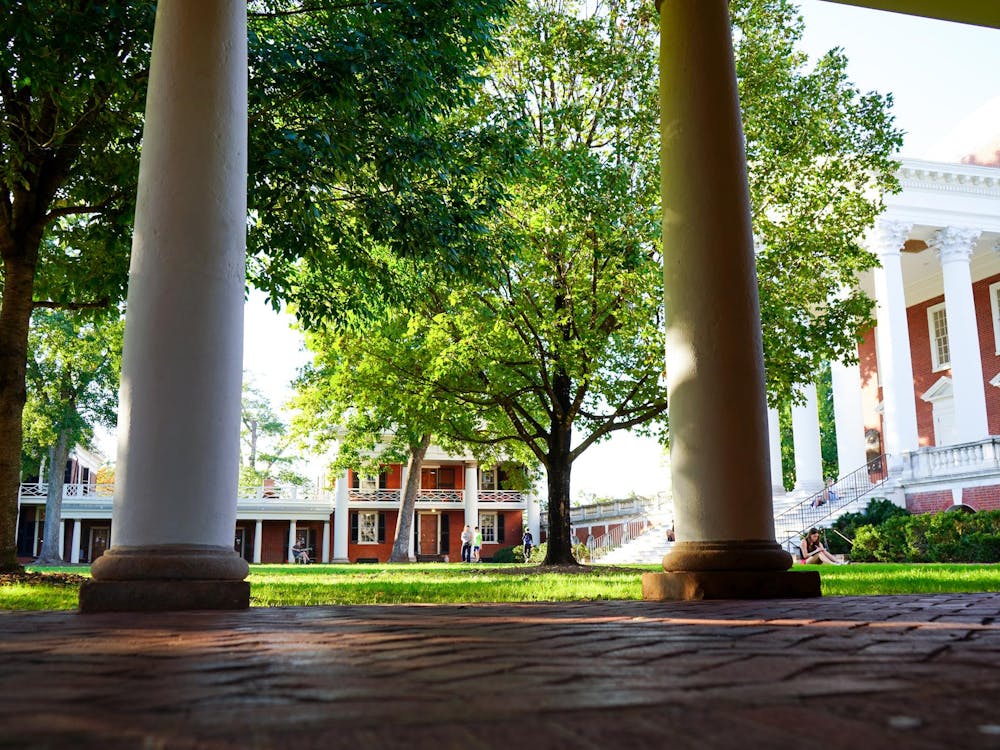The Honor Committee continued debating its proposed policy for investigating Honor violations that arise out of Title IX cases during their general body meeting Sunday night. The discussion lasted over an hour, causing the Committee to push the vote back to a later date in order to further consider the policy’s specific language. Through the policy, Honor seeks a balance between protecting the University community while also maintaining respect for other institutions on Grounds such as Title IX.
The new policy aims to clarify the difference between re-adjudicating a Title IX case, which the proposed policy would prevent Honor from doing, and the Committee’s ability to investigate Honor offenses that arise during a Title IX investigation. This involves distinguishing between what materials are relevant to Title IX’s decision about whether “prohibitive conduct” — which is sexual or gender-based harassment — took place and what offenses are available for Honor to investigate.
Lillie Lyon, chair of the Honor Committee and a fourth-year in the College, said the Committee needs to take its time drafting and revising this policy in order to better represent students.
“We're balancing a lot of different things, so we can't satisfy all of the competing interests in a policy,” Lyon said, adding that “finding the best policy happens when we're helping as many people as we can without harming.”
The meeting began with remarks from a sexual assault survivor named Katherine, a student at the University. After Title IX found her assailant not responsible, she contacted Honor last semester to report her assailant for lying during the Title IX investigation about his intoxication levels, his location and his witnesses.
Katherine said the support officer serving as her advisor — who had four years of experience — thought she had a strong case.
“I not only had witnesses to corroborate what I was saying, but I also had material evidence, like screenshots, to go against what they’re [the accused] saying,” Katherine said.
After Honor took on the case, Katherine was told several weeks later via email that the Committee would drop it.
“In just two sentences, my nine months of fighting for justice came to a halt,” Katherine said in her remarks to the Committee. “Honor was my last hope. I don't think Honor dropped my case out of maliciousness, but rather out of ignorance … I am living proof of your collateral damage.”
Katherine closed her statement by reminding the Honor Committee that the policies which they discuss do not apply in isolated incidents.
“I think about all of the lives that you're affecting, not just me,” Katherine said, “I come as one, but I know there are hundreds. And know that we don't live in a just world. Title IX is an inherently unjust system and Honor now has the opportunity to bring justice.”
Alex Spratley, vice chair for hearings on the Honor Committee and a fourth-year in the College, commented on Katherine’s remarks, stating that she supports the current language used in the policy. Katherine, however, believes it is too restrictive to keep the Committee from investigating Honor violations arising from Title IX.
“I think it was incredibly brave of her to share, and I am thankful that she did,” Spratley said. “I think these are important stories to hear and I am sure it was incredibly difficult for her to do that.”
Katherine’s remarks set the meeting’s focus on the people affected by Honor’s policy. The Committee concentrated on students and Honor’s duty to reflect the values of those who elected them.
“Honor needs to represent the interests of the students,” said Todd Truesdale, an Honor representative and a second-year Law student.
As the discussion’s focus narrowed, Lyon asked the Committee to vote in a straw poll on whether to continue considering the foundational premise of the policy — that Honor should not investigate sexual assault cases since it lacks the expertise and resources, which members unanimously agreed. Members also agreed that the Honor Committee should have the ability to override the Title IX coordinator’s determination that Honor hearing the case would be a re-adjudication of Title IX proceedings. When Lyon asked whether any members supported the policy’s current language, the group did not reach a general consensus.
Lyon noted that Honor finds this decision difficult because the policy addresses such a complex situation.
“In general, developing policy is a difficult thing to do … and this is just extraordinarily complicated, and there's a lot to consider, especially with something like the interaction between Title IX and Honor,” Lyon said. “Just an incredible amount to consider.”
Along with these meetings amongst themselves, the Honor Committee has received outside input from Title IX, University administration, legal counsel and Evan Pivonka, special assistant to the Committee.
“We're not making this decision in a vacuum,” Lyon said. “We're ensuring that we're getting all of the possible information and we're making this decision as well informed as possible.”
Emily Babb, assistant vice president for Title IX compliance and Title IX Coordinator, did not respond to The Cavalier Daily’s request for an interview as of press time.
At its Jan. 19 meeting, Honor discussed examples in which the Committee could pursue an offense embedded in a Title IX case that is not relevant to the investigation, yet the Committee dismissed each example as a poor application of the policy.
During Sunday’s meeting, the Committee discussed possible instances that the policy would encounter, such as investigating the location of those involved in the Title IX investigation, if the accused was brought to Honor for lying during the Title IX proceedings about where they were truly located. However, the Committee discussed how confirming this could be difficult due to complications such as intoxication levels, trauma or an honest memory lapse.
Lyon thinks that, despite the nuances of each case arising out of Title IX that come to Honor, the Committee should continue to consider such examples.
“I think it's at least helpful to come up with general examples to get an idea of what this policy might look like,” Lyon said. “And if new things crop up that we didn't expect, then we will handle them as they come.”
This week, Lyon asked Honor Committee members to draft up their own versions of the policy so the body can analyze proposed language side by side and potentially vote this Sunday.
“We could need another week [after Feb. 2] just to make sure that everything is set, the language is perfect and it has been reviewed before we formally vote on it,” Lyon said. “But I'm hoping by the end of next Sunday's meeting we have come to a conclusion on where we're going to go.”
The Honor Committee encourages members of the community to attend its open meetings every Sunday at 8 p.m. in the Trial Room on the Fourth Floor of Newcomb Hall.







